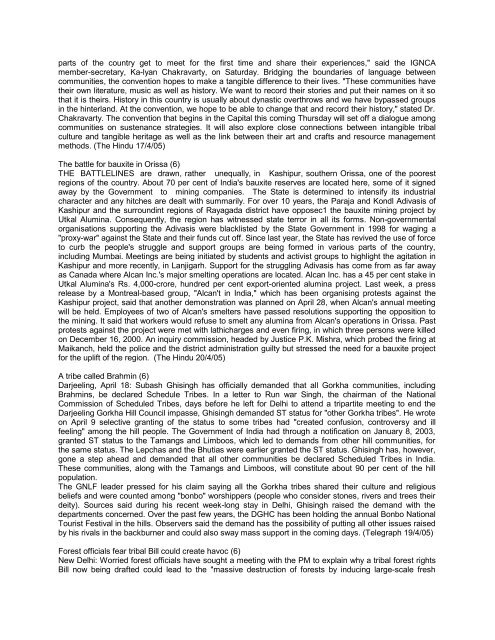You also want an ePaper? Increase the reach of your titles
YUMPU automatically turns print PDFs into web optimized ePapers that Google loves.
parts of the country get to meet for the first time and share their experiences," said the IGNCA<br />
member-secretary, Ka-lyan Chakravarty, on Saturday. Bridging the boundaries of language between<br />
communities, the convention hopes to make a tangible difference to their lives. "These communities have<br />
their own literature, music as well as history. We want to record their stories and put their names on it so<br />
that it is theirs. History in this country is usually about dynastic overthrows and we have bypassed groups<br />
in the hinterland. At the convention, we hope to be able to change that and record their history," stated Dr.<br />
Chakravarty. The convention that begins in the Capital this coming Thursday will set off a dialogue among<br />
communities on sustenance strategies. It will also explore close connections between intangible tribal<br />
culture and tangible heritage as well as the link between their art and crafts and resource management<br />
methods. (The Hindu 17/4/05)<br />
The battle for bauxite in Orissa (6)<br />
THE BATTLELINES are drawn, rather unequally, in Kashipur, southern Orissa, one of the poorest<br />
regions of the country. About 70 per cent of India's bauxite reserves are located here, some of it signed<br />
away by the Government to mining companies. The State is determined to intensify its industrial<br />
character and any hitches are dealt with summarily. For over 10 years, the Paraja and Kondl Adivasis of<br />
Kashipur and the surroundint regions of Rayagada district have opposec1 the bauxite mining project by<br />
Utkal Alumina. Consequently, the region has witnessed state terror in all its forms. Non-governmental<br />
organisations supporting the Adivasis were blacklisted by the State Government in 1998 for waging a<br />
"proxy-war" against the State and their funds cut off. Since last year, the State has revived the use of force<br />
to curb the people's struggle and support groups are being formed in various parts of the country,<br />
including Mumbai. Meetings are being initiated by students and activist groups to highlight the agitation in<br />
Kashipur and more recently, in Lanjigarh. Support for the struggling Adivasis has come from as far away<br />
as Canada where Alcan Inc.'s major smelting operations are located. Alcan Inc. has a 45 per cent stake in<br />
Utkal Alumina's Rs. 4,000-crore, hundred per cent export-oriented alumina project. Last week, a press<br />
release by a Montreal-based group, "Alcan't in India," which has been organising protests against the<br />
Kashipur project, said that another demonstration was planned on April 28, when Alcan's annual meeting<br />
will be held. Employees of two of Alcan's smelters have passed resolutions supporting the opposition to<br />
the mining. It said that workers would refuse to smelt any alumina from Alcan's operations in Orissa. Past<br />
protests against the project were met with lathicharges and even firing, in which three persons were killed<br />
on December 16, 2000. An inquiry commission, headed by Justice P.K. Mishra, which probed the firing at<br />
Maikanch, held the police and the district administration guilty but stressed the need for a bauxite project<br />
for the uplift of the region. (The Hindu 20/4/05)<br />
A tribe called Brahmin (6)<br />
Darjeeling, April 18: Subash Ghisingh has officially demanded that all Gorkha communities, including<br />
Brahmins, be declared Schedule Tribes. In a letter to Run war Singh, the chairman of the National<br />
Commission of Scheduled Tribes, days before he left for Delhi to attend a tripartite meeting to end the<br />
Darjeeling Gorkha Hill Council impasse, Ghisingh demanded ST status for "other Gorkha tribes". He wrote<br />
on April 9 selective granting of the status to some tribes had "created confusion, controversy and ill<br />
feeling" among the hill people. The Government of India had through a notification on January 8, 2003,<br />
granted ST status to the Tamangs and Limboos, which led to demands from other hill communities, for<br />
the same status. The Lepchas and the Bhutias were earlier granted the ST status. Ghisingh has, however,<br />
gone a step ahead and demanded that all other communities be declared Scheduled Tribes in India.<br />
These communities, along with the Tamangs and Limboos, will constitute about 90 per cent of the hill<br />
population.<br />
The GNLF leader pressed for his claim saying all the Gorkha tribes shared their culture and religious<br />
beliefs and were counted among "bonbo" worshippers (people who consider stones, rivers and trees their<br />
deity). Sources said during his recent week-long stay in Delhi, Ghisingh raised the demand with the<br />
departments concerned. Over the past few years, the DGHC has been holding the annual Bonbo National<br />
Tourist Festival in the hills. Observers said the demand has the possibility of putting all other issues raised<br />
by his rivals in the backburner and could also sway mass support in the coming days. (Telegraph 19/4/05)<br />
Forest officials fear tribal Bill could create havoc (6)<br />
New Delhi: Worried forest officials have sought a meeting with the PM to explain why a tribal forest rights<br />
Bill now being drafted could lead to the "massive destruction of forests by inducing large-scale fresh

















